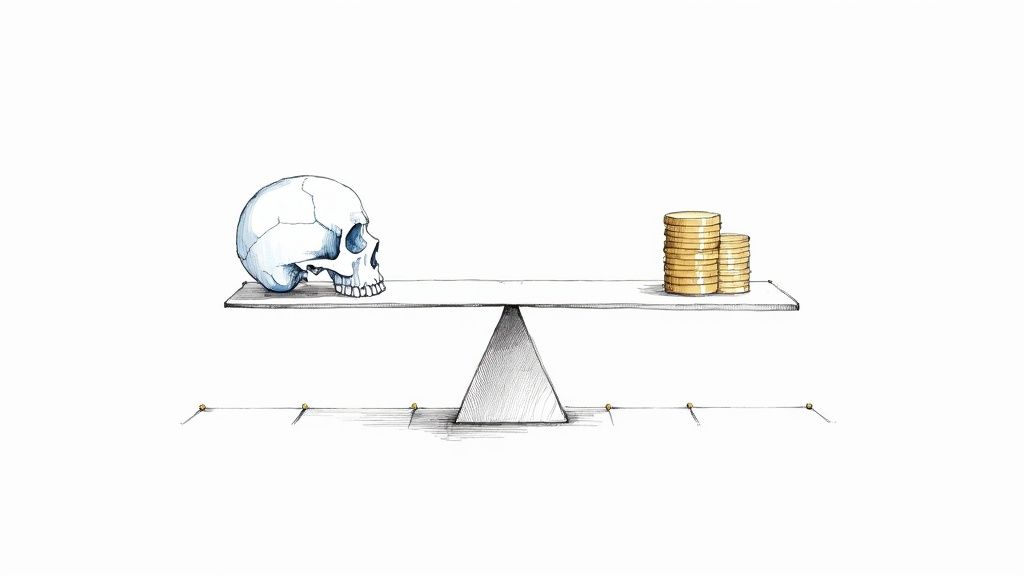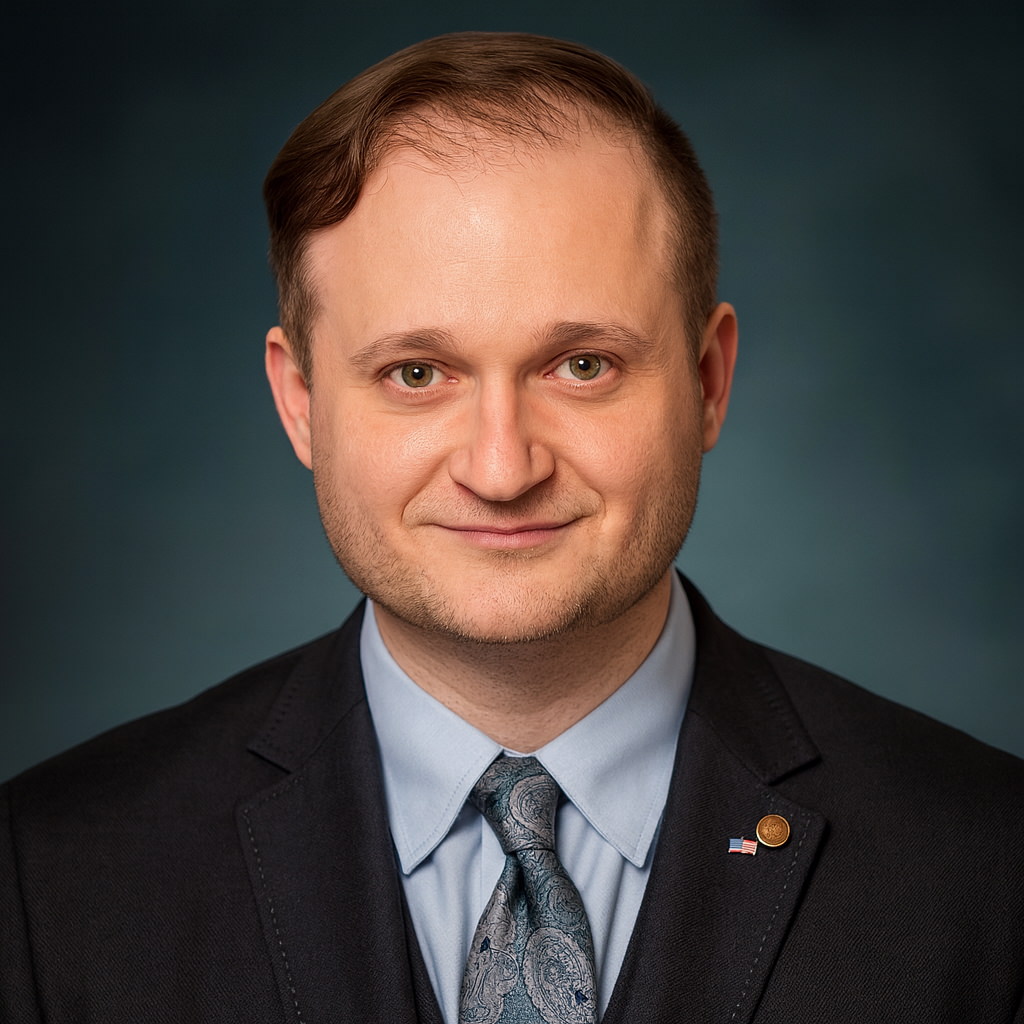As an independent forensic pathologist, I speak with families every day who are navigating an unimaginable loss. In the midst of their grief, they are often left with urgent, unanswered questions. A private autopsy can provide the clarity they need, but one of the first and most practical concerns is the cost.
A private autopsy is a significant investment in truth and certainty. The cost can range from several thousand dollars upwards, but this figure is not arbitrary. It reflects a meticulous, highly specialized investigation tailored to the unique circumstances of each case. This guide is intended to provide a clear, transparent overview of what determines that cost, what the service includes, and why this process has become so essential for families seeking answers.
- Cost Range: A private autopsy typically costs between $3,000 and $10,000+, depending on the complexity of the case and the specialized tests required.
- Key Factors: The final price is influenced by the scope of the examination, the need for ancillary studies like toxicology or neuropathology, and logistical considerations.
- Purpose: The cost covers a comprehensive investigation designed to provide a definitive cause of death, offer legal clarity, uncover potential hereditary conditions, and deliver emotional closure.
- Insurance: Most health insurance plans do not cover private autopsies, as they are considered an elective, postmortem procedure.
An Investment in Answers for Your Family
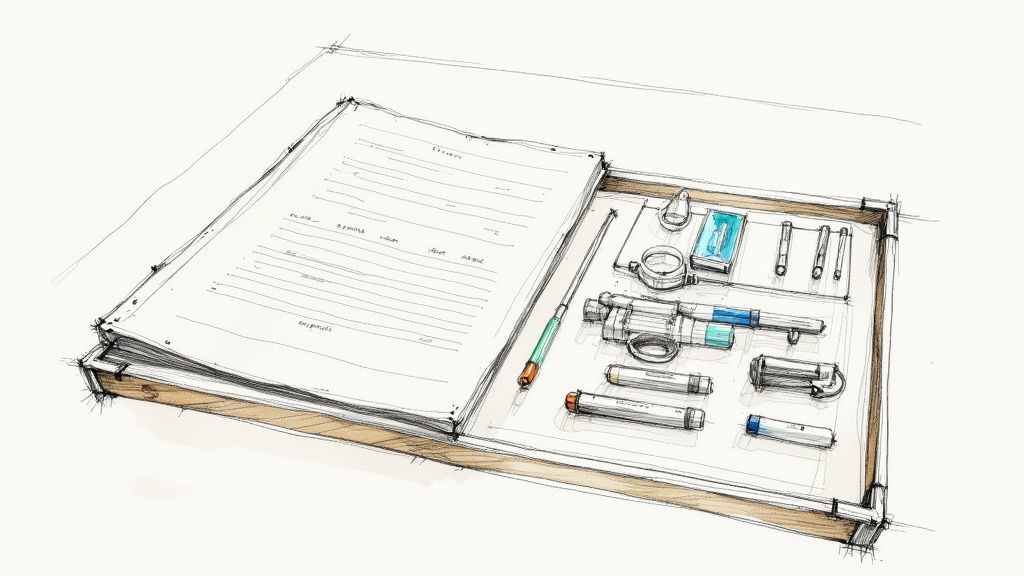
Throughout my career as a forensic pathologist, I have dedicated myself to uncovering the objective medical truths that illness and injury can obscure. My role is to provide families with a clear, scientifically sound explanation for a loved one's death. I approach every examination with the profound respect and dignity the deceased and their family deserve.
Why View It as an Investment?
Framing the private autopsy cost as an "investment" helps clarify its purpose. You are not merely purchasing a medical procedure; you are commissioning a thorough, independent investigation to secure conclusive answers.
This investment delivers tangible value:
- Diagnostic Certainty: It can establish a precise cause of death, resolving ambiguities that may remain in clinical records.
- Legal Clarity: The findings serve as objective, powerful evidence for insurance claims or potential legal actions, such as wrongful death litigation.
- Family Health Insights: An autopsy may uncover hereditary conditions, providing invaluable health information for surviving family members.
- Emotional Closure: For many, understanding why a loved one passed away is a fundamental component of the grieving process.
Understanding the Financial Aspect
The financial reality of a private autopsy is a significant and understandable concern, often arising at a time of emotional and financial strain. Many families find that planning for end-of-life matters through tools like final expense insurance can help cover such unexpected necessities.
While the cost is substantial, it directly reflects the level of expertise, meticulous process, and sophisticated scientific analysis required to deliver the answers your family needs. The final fee is determined by the pathologist's experience, the complexity of the examination, and the necessity of any specialized testing.
What Determines the Cost of a Private Autopsy
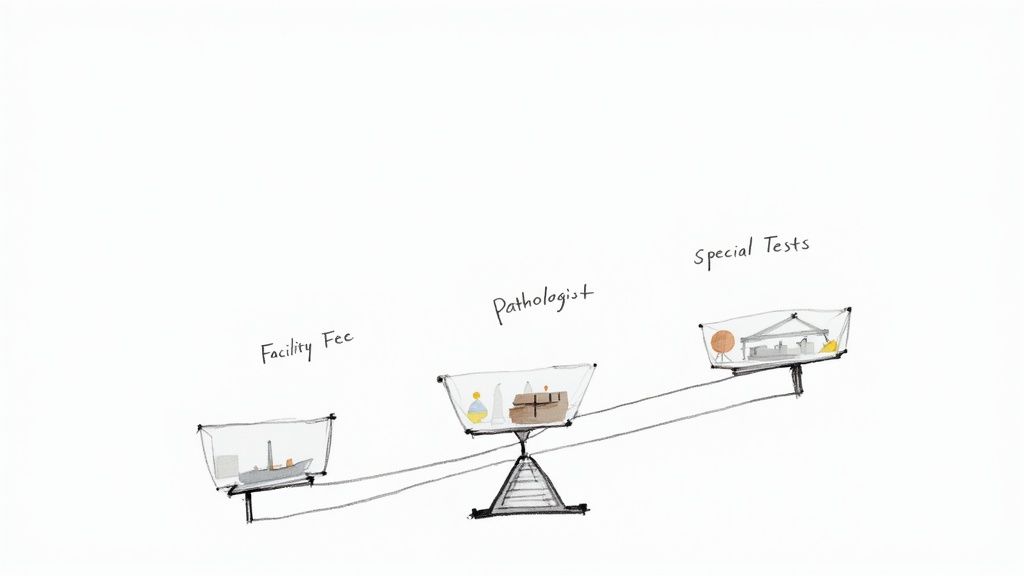
There is no flat fee for a private autopsy, as each examination is tailored to the specific questions a family needs answered. The final cost is a direct reflection of the expert time, specialized laboratory work, and analytical depth required to provide definitive answers. My commitment is to maintain complete transparency about these factors, ensuring you understand exactly what the process entails.
The primary drivers of cost are the case's complexity and the depth of investigation needed to determine an accurate cause of death.
Core Factors Influencing Price
The scope of an autopsy can range from a focused examination to a highly complex investigation. For instance, a case with a well-documented and recent clinical history may be more straightforward than one involving unknown circumstances or significant trauma.
These are the primary elements that shape the final cost:
- Case Complexity: A death with a clear medical history might require a more targeted investigation. In contrast, a case involving multiple injuries, advanced decomposition, or suspected poisoning necessitates a more extensive and time-consuming approach.
- Extent of Examination: A standard autopsy involves a thorough review of the major organ systems. However, some situations require a deeper focus on a specific area, such as a detailed neuropathology examination of the brain or a complex cardiovascular dissection.
- Specialized Testing (Ancillary Studies): The most crucial answers often lie at the microscopic or molecular level. Ancillary studies—such as toxicology, histology (microscopic tissue analysis), and microbiology—are critical for accuracy but are performed by specialized laboratories, which adds to the overall cost.
- Logistical Considerations: Practical details, including the respectful transportation of your loved one and associated facility fees, are also factored into the total cost. I manage these logistics with the utmost care to avoid placing any additional burden on your family.
A precise cost can only be determined through a direct consultation. This allows a pathologist to review the unique circumstances of the case and provide a detailed breakdown of the services required to obtain the answers you are seeking.
Ultimately, every component of the cost corresponds to a crucial step in a meticulous scientific process, designed to deliver the clarity and closure your family deserves.
What Is Included in a Private Autopsy Service
When a family considers a private autopsy, a primary question is, "What exactly does the cost cover?" The private autopsy cost encompasses a complete, in-depth investigation designed to provide clear, legally defensible answers. It is akin to retaining a medical expert to uncover the definitive truth.
My process always begins with a personal consultation with the family. This is not a formality; it is the cornerstone of the investigation. I take the time to listen to your concerns, review all available medical records, and identify the specific questions you need answered. This dialogue guides the entire examination, ensuring it remains focused on achieving the closure you seek.
The Core Components of the Service
Following our initial consultation, the examination proceeds with meticulous care. Every stage is conducted with the highest level of respect for your loved one and an unwavering commitment to scientific accuracy.
Here is a breakdown of what the service entails:
- Respectful Transportation: We coordinate the safe and dignified transport of your loved one to a proper examination facility.
- Comprehensive Examination: I perform a detailed external and internal examination, systematically documenting all physical findings to construct a complete medical narrative.
- Specimen Collection: During the examination, I collect small tissue and fluid samples. These are vital for ancillary tests, such as toxicology, which can reveal details not visible to the naked eye.
- Coordination with Funeral Services: After the examination is complete, we work directly with your chosen funeral home to ensure your loved one is returned promptly, allowing your funeral arrangements to proceed without delay.
The scope of an autopsy can vary significantly, which directly influences the cost. This infographic provides a general overview of how the price may change based on the required depth of investigation.
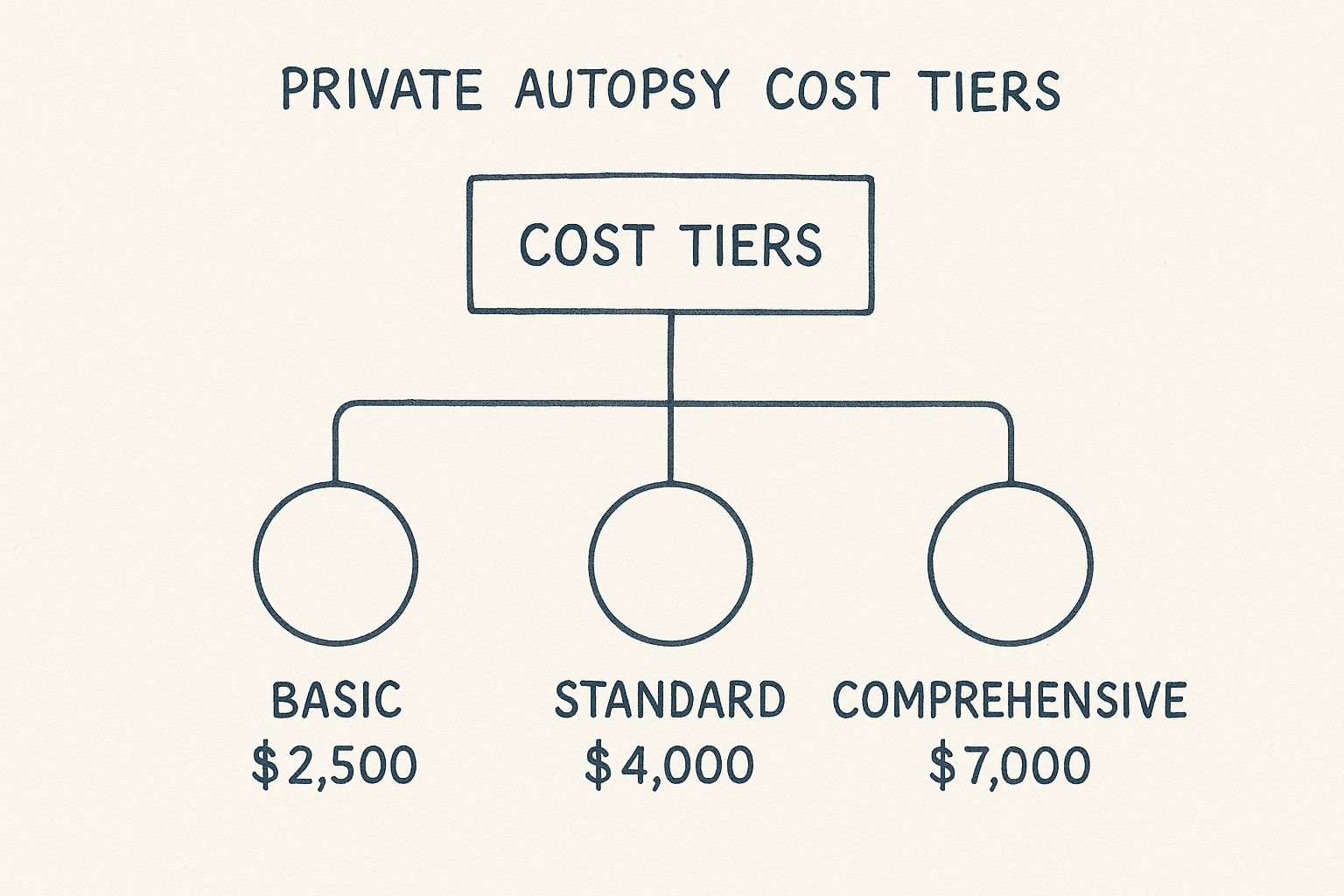
The service can range from a standard examination to a highly complex case requiring extensive specialized testing. The key is to tailor the investigation to the specific needs of your family.
Standard vs. Specialized Autopsy Services
| Service Component | Included in Standard Autopsy | Considered a Specialized Add-On |
|---|---|---|
| Initial Consultation | Yes, a full review of medical history and family concerns. | No, this is always a core part of the service. |
| Full-Body Examination | Yes, both external and internal examination. | N/A |
| Basic Toxicology | Often included for screening common substances. | Comprehensive toxicology panels for specific drugs or poisons. |
| Histology (Tissue Samples) | Yes, routine microscopic examination of major organs. | Specialized tissue stains or analysis for rare diseases. |
| Neuropathology | A basic brain exam is standard. | In-depth examination for conditions like Alzheimer's or CTE. |
| Genetic Testing | No, this is a highly specialized service. | Yes, when investigating suspected hereditary conditions. |
| Final Report | Yes, a comprehensive legal document is always provided. | N/A |
Ultimately, the goal is to provide the services that are essential for answering your questions, ensuring you only invest in what is truly necessary.
The Final, Definitive Report
The entire process culminates in the final autopsy report. This is not a simple summary but a formal legal document that synthesizes all findings from the physical examination, laboratory results, and microscopic studies into a cohesive conclusion.
The final report provides a clear, medically sound cause and manner of death. It is written to be understandable to you and your family while also being rigorous enough to stand in any legal or medical setting.
This report is the final deliverable—the tangible answers you have sought. For more details on the process, you can review this guide to private autopsy services and what to expect. The service is a complete journey, beginning with a question and ending with a final, authoritative answer.
How Specialized Tests Affect the Final Cost
A standard autopsy reveals a great deal, but sometimes the most critical answers are hidden at the microscopic level. This is where specialized laboratory tests, or "ancillary studies," become indispensable. They allow us to detect what the naked eye cannot, whether it is subtle evidence of disease in a tissue sample or the presence of a substance that could explain an unexpected death.
While these tests add to the private autopsy cost, they are often the only means of obtaining the concrete answers your family requires. They can transform a medical mystery into a clear diagnosis, providing objective facts needed for legal proceedings or for personal peace of mind.
Common Specialized Tests and What They Tell Us
Every ancillary study is ordered to answer a specific question. Part of my responsibility is to determine which tests, if any, are necessary for your case, ensuring your investment yields meaningful results.
Here are some of the most common ancillary studies I may recommend:
Toxicology: A toxicology screen is used to detect the presence of prescription drugs, illicit substances, alcohol, and other poisons. This test is essential in cases of suspected overdose or when there is concern about a potential medication error. You can learn more in our guide to the toxicology report after death.
Histology: During the autopsy, I collect very small, paper-thin samples of tissue from all major organs. Histology is the process of placing these samples on slides to be examined under a microscope. This is how we identify conditions like subtle heart disease, early-stage cancers, or infections that were not apparent during the physical examination.
Neuropathology: If there is any concern about a brain-related condition—such as Alzheimer's disease, dementia, CTE from prior head trauma, or a suspected aneurysm—a dedicated neuropathology examination is required. This involves an incredibly detailed study of brain and spinal cord tissue to identify the specific changes that confirm a neurological diagnosis.
Each of these tests is conducted by a specialized laboratory with the advanced equipment and expertise required for this level of analysis. While this contributes to the total cost, the clarity they provide is often invaluable.
In situations where a genetic disorder may be a factor, we can also send samples for DNA analysis. This can be critically important for surviving family members, alerting them to hereditary conditions for which they may need screening. These tests help ensure the final report is as thorough and accurate as modern science permits.
Why Private Autopsies Are Becoming So Essential
Families seeking answers after a death are often surprised to learn that obtaining an autopsy is not as straightforward as it once was. The landscape of postmortem examinations has changed dramatically over the last several decades, and this shift has a direct impact on families like yours.
Simply put, hospitals no longer perform autopsies with the frequency they once did. This has created a significant gap, leaving many families without the closure or vital medical information an autopsy provides. This gap is precisely why the need for private autopsies has grown and, in turn, why understanding the private autopsy cost is so important today.
The Vanishing Hospital Autopsy
There was a time when the hospital autopsy was a routine part of medical practice. It was viewed as an essential tool for quality control, helping physicians confirm diagnoses, understand disease progression, and improve care for future patients.
However, due to a combination of factors—including budget constraints and the advancement of diagnostic imaging technologies—the hospital autopsy has become increasingly rare.
This is not a minor decline; it is a precipitous drop.
In the 1950s, U.S. hospitals performed autopsies in approximately 50% of deaths. By 2020, that figure had fallen to just 7.4%. In the UK and Wales, the rate is even lower, at less than 1% of all deaths. For those interested in the data, you can find more in this article exploring the decline in autopsy rates.
This means that unless a death falls under the jurisdiction of a medical examiner—typically involving suspected foul play, accidents, or public health threats—an autopsy is unlikely to be performed. Families are often left to seek answers on their own.
How Private Services Fill the Void
This is where private autopsy services become critical. They provide the only viable option for families who need to:
- Establish a clear cause of death when it is not immediately obvious.
- Investigate concerns about medical care or potential malpractice.
- Identify genetic conditions that could affect living relatives.
- Obtain objective evidence for legal claims or insurance disputes.
The growing demand for these highly specialized services, coupled with the limited number of board-certified forensic pathologists qualified to perform them, naturally affects both availability and cost. Understanding this context makes it clear that a private autopsy is not just another service—it is a crucial resource for families in a system that no longer provides these answers by default.
When to Consider a Private Autopsy
Families often contact me when they are caught in the space between grief and a persistent feeling that the story of their loved one's death is incomplete. The decision to proceed with a private autopsy is deeply personal, but it almost always stems from a powerful need for answers that the official system is not equipped to provide.
Many people assume a medical examiner or coroner investigates every death, but that is not the case. Their jurisdiction is limited, and they typically intervene only when a death is suspicious, violent, or poses a public health risk. This means that even a sudden death from a known medical condition may not receive further investigation, leaving families with unanswered questions.
Clarifying an Unexpected Death
One of the most frequent reasons families seek a private autopsy is following a sudden, unexpected death. Even if the deceased had a known medical history, a death that occurs without warning can create a painful void.
An independent examination provides a clear, medically sound cause of death, which is often the first step toward finding peace. For more information on situations that fall under official jurisdiction, you can read about when autopsies are performed in our related article.
Other critical circumstances where a private autopsy is the only path forward include:
Concerns About Medical Care: If you have questions about the care your loved one received in a hospital or long-term care facility, an autopsy can provide an unbiased assessment and may uncover evidence of medical error or neglect.
Identifying Hereditary Conditions: An autopsy can reveal undiagnosed genetic diseases, such as certain cardiac conditions or cancers. This information can be an invaluable gift to the living, alerting relatives to serious health risks they may share.
Gathering Evidence for Legal and Insurance Claims: The findings from a private autopsy constitute powerful, impartial evidence. This can be decisive in resolving a life insurance dispute or forming the basis of a wrongful death lawsuit.
Ultimately, a private autopsy is an investment in certainty. It provides the factual foundation needed for personal closure, informed health decisions for your family, and the pursuit of legal resolution.
Common Questions About Private Autopsy Costs
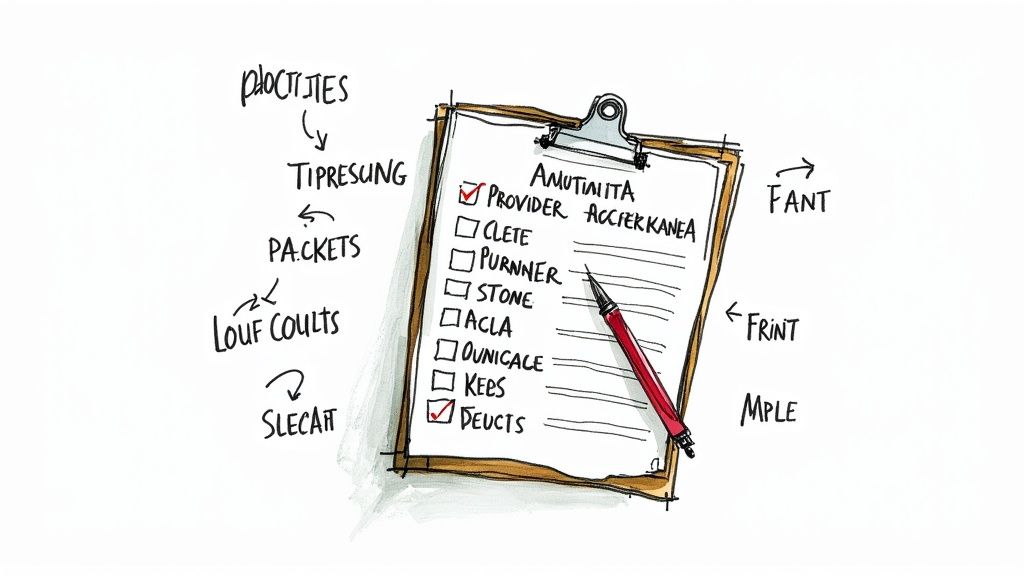
In a time of grief, navigating complex logistics is the last thing any family should have to do. To help, I have compiled straightforward answers to the questions I am most frequently asked about the cost and process of a private autopsy. My goal is to provide clear, honest information to help you make an informed decision.
Does Insurance Cover Private Autopsy Costs?
This is one of the first questions families typically ask. In most cases, standard health insurance and Medicare do not cover the cost of a private autopsy. These plans are designed to fund the medical care of living individuals, and a postmortem examination does not fall within that scope.
However, there are some exceptions. Certain life insurance or accidental death policies may offer reimbursement, particularly if the autopsy findings are critical to processing a claim. It is always advisable to review the specific policy or contact your insurance agent for clarification.
Beyond the autopsy itself, families often face numerous end-of-life expenses. To assist with the broader financial picture, you may wish to explore options like final expense insurance.
Will an Autopsy Interfere with Funeral Plans?
This is a common and understandable concern. Please be assured: a professionally conducted private autopsy will not interfere with your funeral plans, including an open-casket viewing.
I perform every examination with the utmost respect, using techniques that ensure no visible signs of the procedure remain after your loved one is prepared by the funeral home. We coordinate closely and efficiently with funeral directors to prevent any meaningful delay to your arrangements.
Are Payment Plans Available?
It is uncommon for pathology practices to offer direct financing. However, some providers may have flexible payment arrangements or accept payment from a third party, such as a law firm, if the autopsy is integral to a legal case.
The most direct approach is to inquire about payment options during your initial consultation with the provider. They can explain what possibilities are available.
If you have more questions or wish to discuss your specific situation, the team at Texas Autopsy Services is available to provide compassionate and confidential guidance. Please feel free to contact us directly by phone or email to receive the personal attention you and your family deserve.
